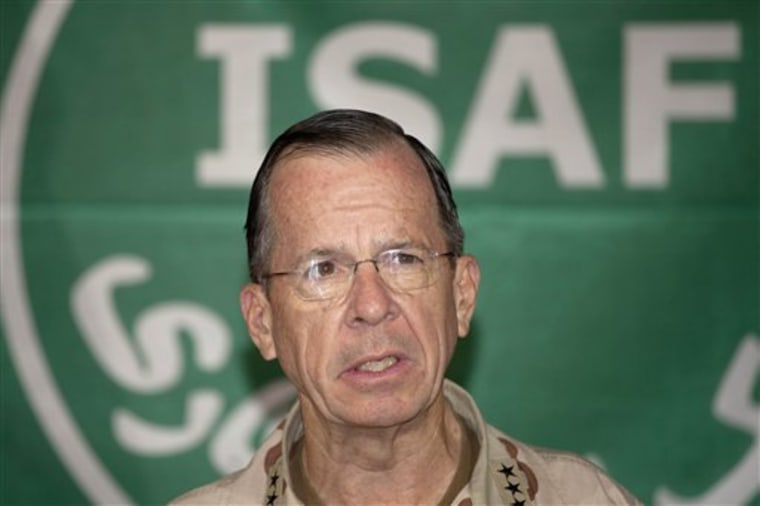Now is the time for Iraq to decide whether to ask American forces to stay beyond the end of the year, the top U.S. military officer said Monday as he arrived in the country, warning that the delay is pushing the U.S. close to the point where a smooth, safe troop withdrawal will be jeopardized.
Adm. Mike Mullen, chairman of the Joint Chiefs of Staff, said that American and Iraqi operations over the last several weeks have tamped down a recent surge in Iranian-backed violence there. And his top commander in Iraq, Gen. Lloyd Austin said the Iraqis are more aggressively pushing back both militarily and diplomatically against Iran.
But the Pentagon is not sure how long that will last, amid worries that if the U.S. pulls its troops out Dec. 31 the Iraqis are too unstable to protect their country without American help.
"Now is the time. We have to know," said Mullen, speaking to reporters just before landing in Mosul. The U.S., he said, is nearly at the point where it will be difficult to pull forces out while still providing support and advice to the Iraqis, maintaining security and keeping the troops protected.
Mullen met with Iraqi Prime Minister Nouri al-Maliki and other top officials, but the Iraqi government has given no indication its decision about U.S. forces is coming quickly.
Increasing frustration
Mullen's visit comes as the U.S. is growing increasingly frustrated with Iraqi leaders' failure to agree on whether they will ask American troops to remain in the country beyond the end of the year, when all but a small contingent of forces are required to leave under an agreement signed in 2008. The decision's importance is underscored by a recent spate of violent attacks and assassinations, along with a report suggesting that Iraq is more dangerous now than it was last year.
In Mosul to greet Mullen, Austin detailed efforts by the Iraqis to redouble their efforts to take on Iranian-backed militants in Maysan Province, and he said the Iraqi troops have partnered with U.S. forces to go after high-level insurgents.
"I believe that the (Iraqi) government has pushed back on the Iranians, and so we're seeing some of those results," he added, referring to diplomatic communications.
Austin said the biggest threat is the flow of armor-piercing explosives moving across the border from Iran to Iraq, and the U.S. withdrawal may heighten that risk.
"We can expect to see more of that in the future and expect to see them focus on those locations where they think that our security is going to be somewhat diminished because of the fact that we're preparing to leave," Austin said.
Building flexibility into troop pull out
He said U.S. commanders are building as much flexibility as they can into the plans for how and where the troops pull out, to minimize the difficulties if the Iraqis decide to ask American forces to stay.
"Anything is possible, some things just cost more money than others," Austin said. "Certainly the concern is we don't want to dismantle something that we'll have to put back into place."
Military leaders insist the Iraqis are working hard to reach a decision, and realize that Washington is reaching a point when it would be difficult to reverse detailed plans to pull out the roughly 46,000 troops that remain.
Mullen also echoed the worries about Iran's stepped up efforts to arm militants in Iraq with more dangerous and sophisticated weapons. Increased influence by Iran on the Iraqis presents a risk to the region, he said, and how the U.S. counters that risk will depend on what Iraq decides on the troop request.
al-Maliki on Sunday reaffirmed Iraq's desire for fighter jets and trainers to help operate and maintain them. Iraq also still needs assistance in intelligence gathering and logistics.
Prior to his remarks, al-Maliki had met with Parliament after Iraq's top political leaders postponed, for the second time in a week, a meeting to discuss whether U.S. troops should be asked to stay.
The 2008 security agreement requires that all U.S. forces leave the country by the end of the year.
After eight years of war, many Iraqis are reluctant to see an extended U.S. military presence, and anti-American cleric Muqtada al-Sadr has pressed to drive out the U.S. military.
While agreeing that al-Sadr has been a challenge, Mullen said Monday that the cleric is "not driving what is going on."
Mullen traveled to Iraq after three days in Afghanistan where he met with military commanders about security progress and the evolving plans to begin withdrawing U.S. troops. President Barack Obama has said that 10,000 U.S. troops will come out of Afghanistan by the end of this year, and another 23,000 by fall 2012.
